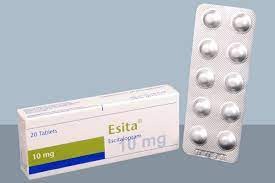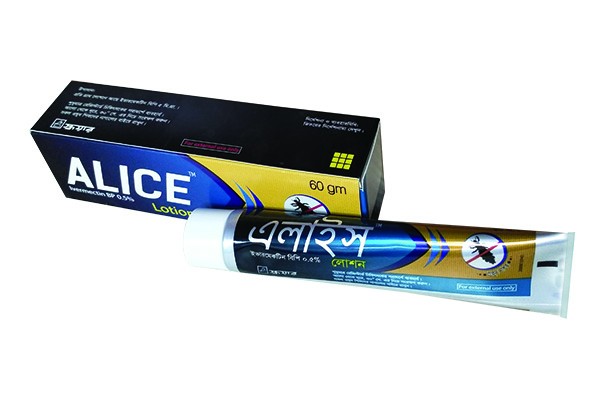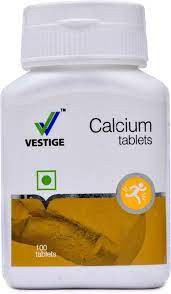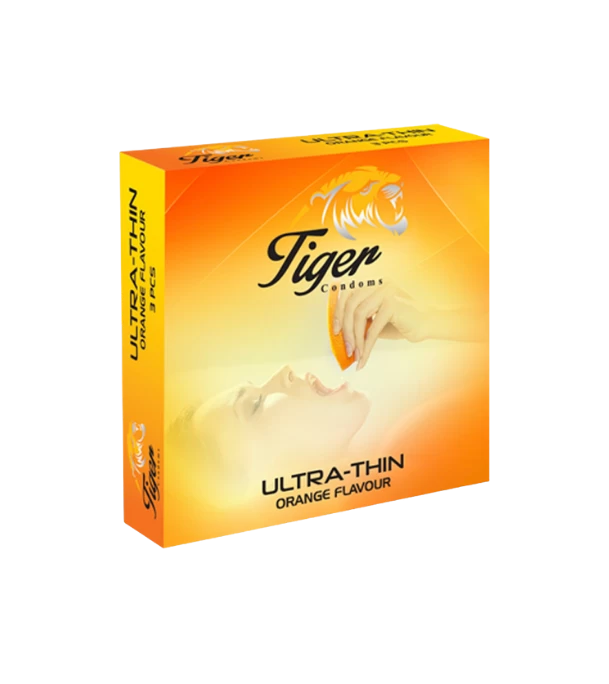

Esita Tablet 10 mg (10Pcs)
Inhouse product
-
৳1,030.00
৳1,550.00 -
৳10.00
৳12.00 -
৳280.00
৳500.00 -
৳127.00
৳132.00 -
৳884.00
৳1,105.00 -
৳30.00
৳60.00
Reviews & Ratings
Indications
Escitalopram Oxalate is indicated in the following indications-
Major depressive episodes
Generalized anxiety disorder
Obsessive-compulsive disorder
Panic disorder with or without agoraphobia &
Social anxiety disorder (social phobia).
Therapeutic Class
SSRIs & related anti-depressant drugs
Pharmacology
Escitalopram is an orally administered selective serotonin reuptake inhibitor (SSRI). Escitalopram is the pure S-enantiomer of the racemic bicyclic phthalate derivative citalopram. Escitalopram is at least 100 fold more potent than the R-enantiomer with respect to inhibition of 5-HT reuptake. Escitalopram has no or very low affinity for serotonergic or other receptors including alpha- and beta-adrenergic Dopamine, Histamine, Muscarinic and benzodiazepine receptors.
Dosage
Major depressive episodes, Generalized anxiety disorder, Obsessive-compulsive disorder:
Initial: 10 mg once daily
Maximum: 20 mg once daily.
Panic disorder:
Initial: 5 mg once daily
Maximum: 20 mg once daily.
Social anxiety disorder (social phobia):
Initial: 10 mg once daily (maybe decreased up to 5 mg)
Maximum: 20 mg once daily.
For elderly (>65 years of age) & hepatic impairment patients:
Initial: 5 mg once daily
Maximum: 10 mg once daily.
Renal impairment: Caution is advised in severe renal impaired patients.
If the dose is increased to 20 mg, this should occur after a minimum of one week.
Paediatric use: Safety and effectiveness in children below the age of 12 years have not been established.
Administration
Escitalopram should generally be administered once daily, morning or evening with or without food.
Interaction
As SSRI or related antidepressants should not be started until 2 weeks after stopping an MAOI. Conversely, an MAOI should not. be started until at least a week after an SSRI or related antidepressant has been stopped (2 weeks in the case of paroxetine and sertraline, at least 5 weeks in the case of fluoxetine).
Contraindications
Escitalopram is contraindicated in patients with known hypersensitivity to Escitalopram or Citalopram or any of the inactive ingredients of the drug product. Concomitant use of escitalopram in patients taking monoamine oxidase/pimozide is contraindicated.
Side Effects
SSRIs are less sedating and have fewer antimuscarinic and cardiotoxic effects than tricyclic antidepressants. Side-effects of the SSRIs include gastrointestinal effects (dose-related and fairly common include nausea, vomiting, dyspepsia, abdominal pain, diarrhoea, constipation), anorexia with weight loss (increased appetite and weight gain also reported) and hypersensitivity reactions including rash, urticaria, angioedema, anaphylaxis, arthralgia, myalgia, and photosensitivity; other side-effects include dry mouth, nervousness, anxiety, headache, insomnia, tremor, dizziness, asthenia, hallucinations, drowsiness, convulsions, galactorrhoea, sexual dysfunction, urinary retention, sweating, hypomania or mania, movement disorders and dyskinesias, visual disturbances.
Pregnancy & Lactation
When treating a pregnant woman with Escitalopram during the third trimester, the physician should carefully consider the potential risks and benefits of treatment. It is excreted in human breast milk. The decision whether to continue or discontinue either nursing or Escitalopram therapy should take into account the risk of citalopram exposure for the infant and the benefits Escitalopram treatment for the mother.
Precautions & Warnings
SSRIs should be used with caution in patients with epilepsy (avoid if poorly controlled, discontinue if convulsions develop), concurrent electroconvulsive therapy (prolonged seizures reported with fluoxetine), history of mania, cardiac disease, diabetes mellitus, angle-closure glaucoma, concomitant use of drugs that increase risk of bleeding, history of bleeding disorders (especially gastro-lntestinal bleeding), hepatic and renal impairment.
Overdose Effects
Symptoms: Symptoms seen in a reported overdose of escitalopram include symptoms mainly related to the central nervous system (ranging from dizziness, tremor, and agitation to rare cases of serotonin syndrome, convulsion, and coma), the gastrointestinal system (nausea/vomiting), and the cardiovascular system (hypotension, tachycardia, QT interval, prolongation, and arrhythmia) and electrolyte/fluid balance conditions (hypokalaemia, hyponatremia).
Management: There is no specific antidote. Establish and maintain an airway, ensure adequate oxygenation and respiratory function. Gastric lavage and the use of activated charcoal should be considered. Gastric lavage should be carried out as soon as possible after oral ingestion. Cardiac and vital signs monitoring are recommended along with general symptomatic supportive measures. ECG monitoring is advised in case of overdose, in patients with congestive heart failure/bradyarrhythmias, in patients using concomitant medications that prolong the QT-interval, or in patients with altered metabolism, e.g. liver impairment.
Storage Conditions
Store below 30°C temperature and protect from light & moisture. Keep the medicine out of the reach of children.
Frequently Bought Products
-
৳1,030.00
৳1,550.00 -
৳10.00
৳12.00 -
৳280.00
৳500.00 -
৳127.00
৳132.00 -
৳884.00
৳1,105.00 -
৳30.00
৳60.00
Online Shopping Bangladesh : MShopBD-Majumder Shop
MShopBD-Majumder Shop Online Shopping in Bangladesh is the Best Shopping store within 10000+ products cash on delivery in dhaka, Khulna, ctg & all over Bangladesh with COD-cash on delivery (Only Shipping Cost Advance ) under by www.esdp.gov.bd (bangladesh.gov.bd ) Home Delivery all Over Bangladesh different location and shop as like as Multivendor Online Sites in BD.
Thank you for choosing MShopBD - Majumder Shop!







